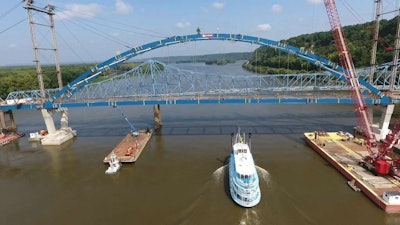 The Trump administration’s new Navigable Waters Protection Rule redefines which water bodies the federal government has authority over, leaving smaller waterways and wetlands to the states to regulate. (Photo of Mississippi River bridge by Illinois DOT.)
The Trump administration’s new Navigable Waters Protection Rule redefines which water bodies the federal government has authority over, leaving smaller waterways and wetlands to the states to regulate. (Photo of Mississippi River bridge by Illinois DOT.)The Trump administration has issued new rules governing waterways and a proposal to change U.S. environmental regulations that roadbuilding industry advocates say will make regulations clearer and speed up road construction projects.
In December, the administration announced proposed updates to implementing the National Environmental Policy Act (NEPA). And on January 23, the administration issued its rewrite of the 2015 Waters of the United States (WOTUS) rule, which was repealed last year.
The changes to WOTUS, which required protections for ditches, streams and small water bodies as defined by the federal government, garnered praise from the Associated General Contractors of America.
“This new clean-water rule employs sound administrative policy to protect our vital waterways while providing permitting clarity for infrastructure and development projects to proceed in a timely manner,” said AGC CEO Stephen Sandherr. “One reason our association has invested so much time and resources into advocating for a measure like this is we expect it will reduce regulatory uncertainty and bureaucratic confusion that threatened to stifle countless essential projects to improve our infrastructure and the environment across the country.”
The American Road & Transportation Builders Association, which has been involved in litigation to repeal the 2015 WOTUS, also praised the administration’s proposal.
“The new rule recognizes that delay and uncertainty only serve to increase transportation project costs,” said ARTBA President Dave Bauer.
The ARTBA says it will fight legal challenges to the Trump administration’s proposal.
The association is also calling on its members to get involved in backing Trump’s changes to the National Environmental Policy Act.
“ARTBA believes the administration’s proposed changes will both reduce delays to key transportation improvement projects and maintain environmental safeguards,” the association says.
The ARTBA is urging its members to submit comments by March 10, as well as attend public hearings, Feb. 11 in Denver, Colorado, and Feb. 25 in Washington, D.C.
New rules defining water bodies
One of the big sticking points of the 2015 WOTUS was which water bodies were federally protected.
The ARTBA argued that under the rule, “roadside ditches could have been subject to unnecessary regulatory oversight, delaying transportation projects, increasing costs and jeopardizing highway safety.” Supporters of the 2015 rule said it prevents pollution from reaching larger bodies of water.
The Trump administration has replaced the Obama era WOTUS with the Navigable Waters Protection Rule. The change, announced jointly January 23 by the Environmental Protection Agency and the U.S. Army Corps of Engineers, differentiates between federal and state protected wetlands.
The federal protections focus on four categories: the oceans and navigable rivers, perennial and intermittent tributaries, certain lakes and ponds, and wetlands adjacent to jurisdictional waters.
Bodies excluded from federal authority are those that “only contain water in direct response to rainfall; groundwater; many ditches, including most farm and roadside ditches; prior converted cropland; farm and stock watering ponds; and waste treatment systems.”
Those waters would be left to the states to regulate.
“EPA and the Army are providing much needed regulatory certainty and predictability for American farmers, landowners and businesses to support the economy and accelerate critical infrastructure projects,” said EPA Administrator Andrew Wheeler. “After decades of landowners relying on expensive attorneys to determine what water on their land may or may not fall under federal regulations, our new Navigable Waters Protection Rule strikes the proper balance between Washington and the states in managing land and water resources while protecting our nation’s navigable waters, and it does so within the authority Congress provided.”
Rewriting national environmental policy
The Trump administration has proposed the following changes to the administration of the National Environmental Policy Act, according to ARTBA:
- Environmental impact statements must be completed within two years and face a page limit. Those statements could also be developed by private entities under federal agency supervision.
- A single, final environmental document would be required for projects with multiple agencies.
- A lead agency would set a schedule for projects with multiple agencies.
- All litigation must be raised during the comment process.
- A project would only be responsible for impacts it directly causes, not potential impacts.
- Alternatives to a project must be “technically and economically feasible.”
- Non-federal projects would be excluded from review.
- Projects would be allowed to address violations while still moving forward.
The proposed NEPA rules were published January 10 in the Federal Register.







